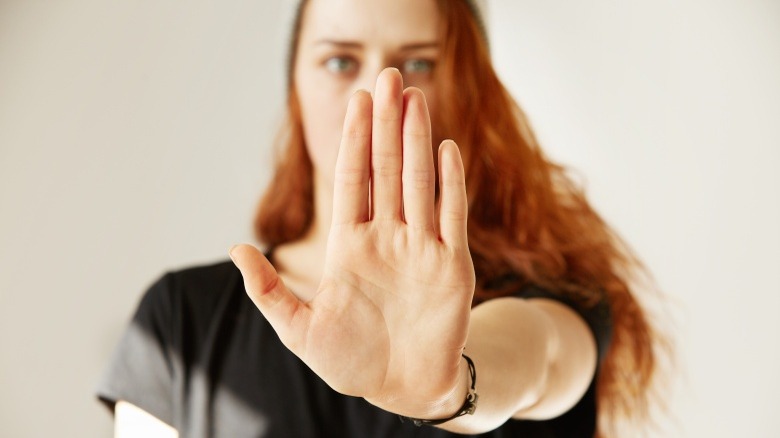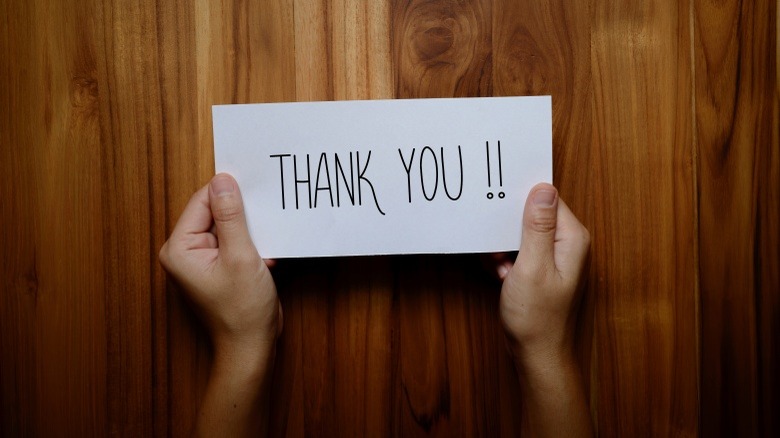Features That Turn People Off
The last thing you want to do if you're looking for love is send the kinds of signals that turn people off. Relationships are hard, especially in the beginning. You meet someone you think you like, and at first you're hopeful. But it doesn't take long for things to turn sideways. In fact, one researcher at Stanford found that more than 60 percent of relationships don't survive the first year.
We all know there are some things we just shouldn't do on a first date, but what about during the rest of the relationship? If your love life has been plagued by one unhappy ending after the other, it's time to start thinking about why. Sure, it's possible that your radar just has a penchant for picking the wrong mates, but it's also possible that you're doing something that's turning people off. It's a hard truth, and not something anyone really wants to face, but it could be the answer. By taking a real look at yourself, you just might find that you unknowingly possess one of these traits that are known to send people packing.
We spoke with several psychologists and relationship experts to find out just what features people most definitely aren't looking for. The following qualities and features might be preventing you from being your best self, so are they also holding you back from finding your perfect match?
Emotional instability
Many people say they're looking for someone who isn't afraid to show their emotions, but Dr. Iris Pachler, licensed psychologist and clinical director of New Harmony, Psychological Associates, says too much emotion is a problem, too. She names emotional instability as a feature that quickly turns many people off.
"Emotional instability is usually displayed as an intense emotional experience, followed by behavior that leads to interpersonal issues, such as lashing out verbally, physically, or through manipulations. Such dramatic displays can feel controlling and push people away," she explained.
Lacking boundaries
We've all met a person who seems to have no respect for personal space. It's an annoying feature, right? Psychologist and psychoanalyst Susan Kolod, Ph.D, says this a feature that many people don't find attractive. She mentions things like getting too close, gesticulating frequently, bumping into people and just plain getting in others' faces.
"In my experience, people who behave in these ways are often unaware of how they are affecting those around them. It is possible for a person to become more self-aware and to modulate and control these behaviors," she said. Do you find people tend to take a few steps back from you during conversations? This may something you're doing without even knowing it.
Dating and relationship coach, therapist and author Amy Sherman says people who are often loud and obnoxious also fall into this category. "You are unaware of the impact you have on others or how people are reacting to you [when you are overly loud]," she warned. "This 'cluelessness' does not bridge any emotional connections between people."
Rudeness
It's common sense that being rude to a date isn't going to get you very far (though the opposite is also apparently true), but being rude to others doesn't gain you any points, either. Jessica Small, licensed marriage and family therapist and dating coach, says rudeness to people around you can be a big turn off to potential partners.
"This can be anything from being rude to a server, to not holding open the door for the people behind you. Men especially tend to seek out kindness in their partner as a desirable characteristic and will turn away from perceived rudeness," she explained.
Self-absorption
It's not all about you, all the time, and that's especially true on dates, explains licensed marriage and family therapist and dating coach Jessica Small. "Talking only about yourself and not asking your date any questions is a huge turn off. This is something my dating clients complain about often when sharing bad dates. It's imperative to keep the conversation reciprocal in order to not come off as self involved," she said.
So if you're spending a lot of time talking about yourself or taking selfies on a date, this is probably a feature you want to re-evaluate.
Being a bore
It's not always easy to find things to say on a date, especially if you're nervous, but clamping down and not being a part of the conversation can be a turn off. In fact, being a bore is a feature that could very quickly cause the date to end without another in sight.
"Answering questions with one to two words or not being willing to share some of the exciting or adventurous things you've done in your life can create a perception of 'nice but boring," said licensed marriage and family therapist and dating coach Jessica Small. "It's important to make a memorable impression on your dates by giving enough information so the other person has some understanding of who you are and what you like to do."
Being too accomodating
It seems like being accommodating would be a good feature, right? Turns out it's not, at least if you're doling it out in big doses, according to Rhonda Milrad, founder and chief relationship adviser of Relationup.com. "You may be a caretaker or someone who doesn't have strong preferences, but when your date keeps hearing 'whatever you want,' or 'I don't care,' there can be growing concern that you don't have a strong sense of yourself. It is important for a partner to feel that you have a strong identity and aren't just a vacuous push-over."
Entitlement
A bit of self confidence can be an attractive feature, but too much of it works in just the opposite way and can actually turn people off, says Dr. James Huber, licensed marriage and family therapist. "Everyone is unique and special in some important way, but persons who have learned to think that the world owes them often convey this belief to others who may wish for more humility and empathy in the relationship," he explained.
Listening to your girlfriends first
There's something to be said for the solidarity of women, and the value of female friendships. It's one of the biggest benefits of being a woman, if you ask me. But your man needs to know that his opinion counts, too. Because being left out is definitely a turn off.
"It's hard for males to compete with the 'wisdom' of your girlfriends — and they would rather leave you than have to be in competition with them," warned Dr. Reneé Carr. "Listening too much to your girlfriends communicates to him that you value their input more than his and that you trust them more." Of course, you should still listen to your besties, but he needs to know that you care about what he thinks, too.
Lack of purpose or direction
It's important to have a sense of where you want your life to go, more for yourself than for anyone else. But a lack of direction can also be detrimental to possible relationships. As much as we all love a free spirit, not having a purpose — or at least a semblance of ambition — can certainly turn people off.
"When someone lacks a strong sense of purpose or vision for his or her life, it's difficult to imagine what kind of future we might have by aligning ourselves with that individual," said Chanel Dokun, founder of LifePlan NYC. "For example, if we want to live a vibrant, thriving life, how can we be sure that the other person's idea of the good life at all matches our own? Will our rhythms be in sync? Will our goals carry us in a compatible direction? We're not sure, and that uncertainty turns us off big time as our brains quite literally try to shut down any unpredictability or lack of categorization. On the flip side, a person who has a clear purpose for why they exist and a plan to match that purpose is incredibly attractive — we feel swept up in the current of passion and adventure that lies ahead for that individual and, as a result of our partnership, our own dynamic future that awaits."
Lack of empathy
There's a lot to be said for understanding someone else's feelings, or at least trying to. It's one of the most immediate ways we relate to each other as humans, and a lack of that understanding and connections may turn someone off.
"A huge turnoff in most relationships is a lack of empathy," said dating and relationships coach, mentor and author, Rosalind Sedacca, CLC. "Empathy is the quality of being able to put yourself in your partner's shoes and see the world from their perspective. Relationship partners who have empathy are more compassionate and accepting when things go awry. They try to understand what you were feeling, what motivated you and why you behaved as you did. Empathetic partners are more likely to forgive, move on and let go of past hurts" she explained. "Those who don't show empathetic behavior are usually more self-righteous, self-absorbed and less likely to apologize or take responsibility for their behavior. They make for more difficult relationship partners and demonstrate less emotional maturity as well."
Being too clingy
Hey, we get it. You're in a new relationship and you want to be around that person all the time. It's a natural part of the "honeymoon phase" we hear so much about. But it's easy to jump from being attentive to crossing the line — and if that line gets crossed too often, it may send people running in the other direction.
"One of the biggest turn offs for people is being too clingy or needy in relationships," says Dr. A.J. Marsden, assistant professor of human services and psychology at Beacon College. "Overly clingy and dependent people can end up pushing a more mentally and securely attached individual away." She warns that clingy behavior includes constantly asking questions like, "What's wrong?" and "Are you mad?"
Dr. Reneé Carr agrees that clinginess often causes problems early on in a relationship. "Although most men like to be needed, being needy is completely different and a turn off. A healthy man wants a woman who is confident and wants (vs. needs) him in her life," she said.
"It is important to recognize the cause of one's needy behavior. This can be best accomplished with family or individual therapy," Marsden added. "It is also important to give others space when they ask for it, no matter how challenging this is to do. Keep an eye on potential triggers that might contribute to sudden needy behaviors, and if you experience anxiety or depression, seek help from a professional."
Antagonism
It's no surprise that people who tend to antagonize their partners continually find themselves single, according to licensed psychologist Dr. Iris Pachler. "Antagonism can be seen as the opposite of agreeableness and is often displayed as an exaggerated sense of confidence, in turn ignoring others' needs, or even using them for self-gratification.Others usually feel uncomfortable or even threatened in these situations," she said.
The takeaway from this is simple — people aren't attracted to those who likes to push other people's buttons. Instead of making you look superior, most people just perceive it as pettiness. That's a definite turn off.
Interrupting
If you've ever had a friend who just wouldn't let you finish a sentence without cutting you off, then you know how annoying a person who tends to interrupt can be. "We live in a rapid-paced society where many people seem to be in a hurry. A person who can't slow down enough to wait for a friend to finish her thought may soon be on the fast track to loneliness," said licensed marriage and family therapist, Dr. James Huber. If you're one of those people who just can't wait to blurt out a thought, train yourself to let others finish their sentences before interjecting.
Clinical Psychologist Amanda Mulfinger gives us an easy way to move past this habit. "The easiest way to do this is to practice with your friends and family. Pick one or two people that you trust, with whom you interact regularly, and set up a deal where they point out every time you interrupt them. Once you learn to start recognizing the problem, you can start to make the change — if you want to."
Narcissism
There are few things less appealing than a person who thinks they can do no wrong. No one wants to be in a relationship with someone who can't own up to their faults, so this kind of narcissism definitely turns people off.
Take the advice of licensed marriage and family therapist, Dr. James Huber and don't be that person. "Perhaps it's a reflection of our growing love affair with selfies, but people who have an inflated sense of self-importance and a high need for attention and admiration often become more infuriating than endearing to others," he said.
Not being attentive
It's important to be connected these days, but one feature that turns people off is if someone is so connected to technology that they aren't connecting to the people around them. That cell phone that's always in your hand may be the reason you haven't your perfect match, says April Davis, owner and founder of LUMA.
"This may seem like a no-brainer, but in today's world of mobile devices, constant technology distractions, and short attention spans, I meet many people that would like to find love that can't seem to live in the moment," she said. "Being present and attentive is the easiest, most sure-fire way for people to find you attractive. Learn to listen, make eye-contact, and ask questions! If someone can visibly see that you are interested in them, they are much more likely to reciprocate."
Lack of responsiveness
At the beginning of a relationship, people either feel a connection or they don't, right? You may think you have no control over that connection, but you may actually be responsible for why the other person is feeling turned off. Licensed marriage and family therapist Marni Feuerman says you do have some control over how strong that connection is — and it's all about whether or not you respond to the other person.
"A lack of responsiveness turns people off. I am talking about emotional responsiveness. This is what builds a bond and connection, especially a romantic one," she said. "When you reach for someone, you should feel that he or she is there for you. This could mean the small everyday things like discussing a story in the news, some gossip you heard or how your day went. But, it also applies to the bigger things, like when you got really bad news, fell ill or got hurt by someone in your life. Without responsiveness, people start to feel alone in a relationship. That eventually leads to one or the other wanting to end the relationship or check out emotionally."
Low self-esteem
Sure, your partner should be able to pick you up when you're feeling blue, but being down on yourself all the time can be exhausting for everyone around you — a definite turn off.
"Regardless of how much he is attracted to or loves you, being insecure and always asking for re-assurance of your attractiveness or his faithfulness will make him view you as draining and weak. He will be turned-off with the idea that being with you will mean having to constantly guard what he says or does to avoid hurting your feelings." explained Dr. Reneé Carr.
Not being appreciative
"Thank you" is a phrase that many seem to take for granted, but Gabriela Galvan de Antillon, CEO and founder of Blue Pearl Therapeutic, says the words are important. "One feature that turns partners off is when they feel unappreciated by their loved one. That all the acts they do are looked over, or are now just expected as standard without some recognition," she said. It doesn't take much to be appreciative, but it can go a long way.
Whining
Whining is never attractive, but sometimes we don't realize how often we're doing it — or how much of a turn off it can be. Licensed marriage and family therapist James Huber says it's a quick way to lose someone's interest. "Everyone has stress and needs to complain occasionally. But constantly using words, tone and body language to convey 'woe is me!' can generate space from others, not sympathy," he explained.
Not smiling
Resting B*tch Face is a feature that many women have and that may be totally out of their control. Still, ladies with RBF, this one is for you. The first impression is a big one, and simple smile can make all the difference, says dating and relationship coach, therapist and author Amy Sherman. She explains that not smiling — even if it's not intentional — makes you intimidating and unapproachable. "So if you want to be more likable, learn to smile more and to laugh at yourself. Both reduce tension and make others feel more comfortable around you," she advised.
Being self-conscious
This one is a hard nut to crack. Being self-conscious seems to be one of those features that's just ingrained into who are, but Jocelyn and Aaron Freeman, relationship mentors and authors of the book, The New Power Couple, say it's something you can change (and maybe should).
"One of the most common characteristics that we see turns people off in their dating experience is being self conscious. Many people think of being self-conscious as only focusing on body appearance, but it actually shows up for people in holding back who they really are so they look good for the other person," they explained.
"For example, someone might be saying they enjoy certain activities or agree with their beliefs, but they really don't agree. This becomes a turn off as the person starts to discover they actually don't know the person because they are too self-conscious to be self-expressed about who they are." Their advice is simple, "Be who you are completely! Own your qualities, own your beliefs and share honestly. You won't want to be with a person that doesn't really know who you are anyway. And you'll be able to attract the person that is in complete alignment with your authentic self. "






















